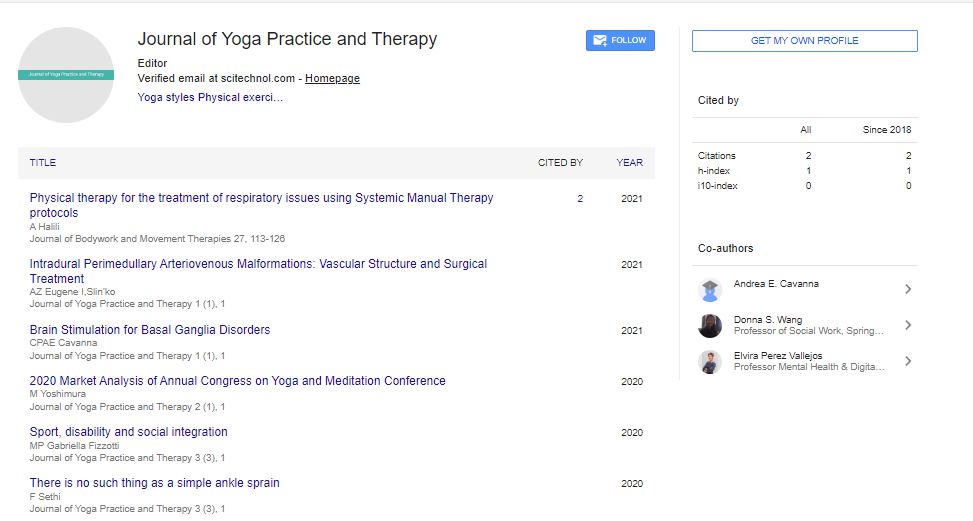Commentary, J Yoga Pract Ther Vol: 6 Issue: 2
The Advantages of Meditation for Mental Health: Developing the Mind-Body Connection
Alejandro Ramirez*
1Department of Yoga Therapy, University of Delhi, New Delhi, India
*Corresponding Author: Alejandro Ramirez,
Department of Yoga Therapy,
University of Delhi, New Delhi, India
E-mail: aleja.ramirez@gmail.com
Received date: 29 May, 2023, Manuscript No. JYPTY-23-107035;
Editor assigned date: 31 May, 2023, PreQC No. JYPTY-23-107035 (PQ);
Reviewed date: 14 June, 2023, QC No. JYPTY-23-107035;
Revised date: 21 June, 2023, Manuscript No. JYPTY-23-107035 (R);
Published date: 28 June, 2023, DOI: 10.4172/jypty.1000120
Citation: Ramirez A (2023) The Advantages of Meditation for Mental Health: Developing the Mind-Body Connection. Int J Yoga Therap 6:2.
Description
The pursuit of mental well-being has become increasingly vital in today's fast-paced and interconnected world. In this journey, meditation has emerged as a potent practice that nurtures the mindbody connection and holds the potential to revolutionize how to approach mental health.
Mind-body connection
The mind and body are intricately connected, and what affects one can significantly impact the other. Stress, anxiety, and negative emotions can manifest physically, leading to various health issues. Meditation serves as a bridge between the mind and body, allowing individuals to access the power of their thoughts and emotions to promote healing and overall well-being.
Meditation for anxiety
Anxiety disorders are among the most prevalent mental health issues worldwide. Meditation has gained recognition as an effective tool for managing anxiety and related symptoms. By encouraging mindfulness and the observation of thoughts without judgment, meditation helps individuals distance themselves from anxious thinking patterns. Over time, this practice reduces the grip anxiety has on one's mind, leading to increased feelings of calm and control.
Meditation for depression
Depression can often be accompanied by feelings of helplessness, sadness, and a lack of motivation. Meditation has shown promising results in easing depressive symptoms by promoting self-compassion and emotional regulation. Through meditation, individuals can develop a deeper understanding of their emotions and cultivate a positive mindset, leading to a more balanced outlook on life.
Meditation and stress reduction
Chronic stress is a significant contributor to various mental and physical health problems. Meditation, with its ability to induce the relaxation response, counteracts the detrimental effects of stress. By engaging in regular meditation, individuals experience reduced cortisol levels and increased production of feel-good hormones like serotonin and dopamine, fostering a sense of peace and contentment.
Mindfulness-Based Cognitive Therapy (MBCT)
Mindfulness-Based Cognitive Therapy (MBCT) is a therapeutic approach that combines elements of cognitive therapy with mindfulness practices. It is particularly effective in preventing relapses of depression and managing chronic stress. MBCT helps individuals identify negative thought patterns and respond to them with mindfulness, preventing the spiral into depressive or anxious episodes.
Meditation and emotional regulation
Emotional regulation is a vital aspect of mental health. Individuals who struggle with emotional regulation may find themselves overwhelmed by their feelings, leading to impulsive actions and emotional distress. Meditation cultivates emotional intelligence by teaching individuals to observe their emotions non-judgmentally and respond to them in a balanced manner. This enhanced emotional regulation allows for more constructive problem-solving and healthier interpersonal relationships.
Meditation as a complementary therapy
Meditation complements conventional mental health treatments and therapies. While it is not a replacement for professional help, it can significantly enhance the overall effectiveness of treatment plans. Many therapists and mental health professionals incorporate meditation and mindfulness practices into their sessions to empower individuals with additional tools to manage their mental well-being.
Conclusion
The journey to improved mental health and well-being can be transformative, and meditation has emerged as an invaluable ally in this pursuit. By nurturing the mind-body connection and promoting mindfulness, meditation offers a multitude of benefits, including reduced anxiety, improved emotional regulation, and enhanced resilience. As society becomes increasingly aware of the importance of mental health, integrating meditation into our lives can pave the way for a happier, healthier, and more balanced existence. Whether used as a standalone practice or in conjunction with other therapies, meditation stands as a beacon of hope, guiding us towards a brighter and more mindful future.
 Spanish
Spanish  Chinese
Chinese  Russian
Russian  German
German  French
French  Japanese
Japanese  Portuguese
Portuguese  Hindi
Hindi 